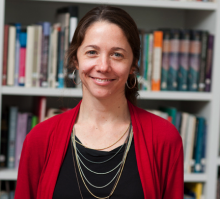What Is It
We all want to lead a moral life. But even if we all agreed on what that would mean, we still have to balance our own self-interest with the competing demands of morality. This becomes even more challenging when the decks are stacked against us, or when everyone around us is only looking out for themselves. So in the real world, what does it mean to live a moral life? Do we have a responsibility to act morally when others around us are not? And what do we do if morality makes excessive demands of us? John and Ken balance their own self-interests with Tamar Schapiro from Stanford University, for a program recorded live as part of the Stanford Continuing Studies series The Art of Living.
Listening Notes
The show begins with John posing the question of whether living morally adds or detracts from the goodness of a life. Ken tells John that if a person does the moral thing, he will lead a better life, and vice versa. John agrees but proposes a scenario in which individuals evade paying taxes. While it would be morally correct to pay your taxes regardless of the arguably morally wrong actions of others, what good would come from this action? You would be a saint among sinners, says John. He then proposes to Ken that there is no scale for what is morally correct: in a country in which people frequently steal, is a little stealing okay? Ken is torn, and John suggests that morality could be thought of in terms of ulterior costs and benefits, but Ken thinks John is mistaken, for morality is its own reward. John and Ken conclude that many other factors play into determining what a good life is.
Ken and John are joined by guest Tamar Schapiro, Professor of Philosophy at Stanford University, whose work focuses on ethics. John begins by asking Tamar what draws her personally to the study of ethics. She explains that it is both a matter of intellectual curiosity and a desire for self-improvement. Her interest in ethics sprung as she realized the respect her parents had for her, and her analytical mind led her to study philosophy and mathematics, though she dropped the latter topic when she realized it did not have enough do with life.
John then proposes to Tamar the following scenario, which he posed to Ken at an earlier point: suppose there is a magical ring that enables people to act immorally with impunity – would she take the ring and put it to use? Tamar hesitates to predict how she would act under stress, though she explains that she can’t say she wouldn’t be tempted to use the ring. She adds that she thinks it would be right not to play with the ring. Ken explains that it was Plato who proposed a similar experiment, believing that no one is ever willingly moral. Tamar draws a distinction between principle and pressure, explaining that when one focuses on whether he is acting on principle or due to pressure, and this person takes seriously the idea of the former, he can both be himself and be good, which amount to the same thing.
Ken asks Tamar whether she thinks that living morally equates to living a good life. Tamar says that this depends on the meaning of ‘living well’ and that morality is what makes a person a person in the first place. John asks of the in-between of living morally and living immorally, which Hume proposed. Ken and John then invite audience participation, and concerns such as the overarching goal of morality and education as it relates to the topic are discussed with the public. The show concludes with Tamar reflecting on whether morality is merely an instrument we use or whether it should be valued in itself.
- Roving Philosophical Reporter (Seek to 5:56): Caitlin Esch talks to Eric Knott, a baseball pitcher during the peak of the steroids era in the sport. Knott provides context, discusses his decision to not take steroids, at the time freely discussed drugs, and explains how this decision has affected him.
- 60-Second Philosopher (Seek to 49:07): Ian Shoales explores the “live and let live” mindset of his family and the moral differences and threats that pervaded his neighborhood growing up. Among these were communism, racial differences, and homosexuality. Ian also focuses on eliminating prejudice.



